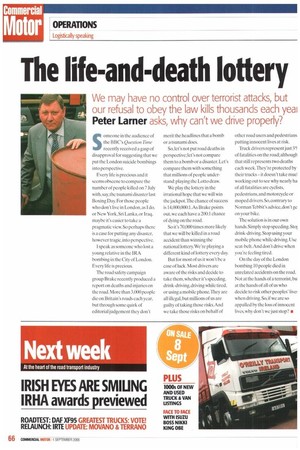The life-and-death lottery
Page 66

If you've noticed an error in this article please click here to report it so we can fix it.
We may have no control over terrorist attacks, but our refusal to obey the law kills thousands each yeai Peter Lamer asks, why can't we drive properly?
Someone in the audience of the BBC's Question Time recently received a gasp of disapproval for suggesting that we put the London suicide bombings into perspective.
Every life is precious and it seems obscene to compare the number of people killed on 7 July with, say, the tsunami disaster last Boxing Day. For those people who don't live in London, as Edo, or New York, Sri Lanka, or Iraq, maybe it's easier to take a pragmatic view. So perhaps there is a case for putting any disaster, however tragic, into perspective.
I speak as someone who lost a young relative in the IRA bombing in the City of London. Every life is precious.
The road safety campaign group Brake recently produced a report on deaths and injuries on the road. More than 3,(XX) people die on Britain's roads each year, but through some quirk of editorial judgement they don't merit the headlines that a bomb or a tsunami does.
So, let's not put road deaths in perspective; let's not compare them to a bomb or a disaster. Let's compare them with something that millions of people understand: playing the Lotto draw.
We play the lottery in the irrational hope that we will win the jackpot.The chance of success is 14,000,000:1. As Brake points out, wc each have a 200:1 chance of dying on the road.
So it's 70,000 times more likely that we will be killed in a road accident than winning the national lottery. We're playing a different kind of lottery every day.
But for most of us it won't be a case of luck. Most drivers are aware of the risks and decide to take them, whether it's speeding, drink-driving,driving while tired, or using a mobile phone.They are all illegal, but millions of us are guilty of taking those risks. And we take those risks on behalf of other road users and pedestrians putting innocent lives at risk.
Truck drivers represent just 3°/ of fatalities on the road; although that still represents two deaths each week.They're protected by their trucks — it doesn't take mud working out to see why nearly ha of all fatalities are cyclists, pedestrians, and motorcycle or moped drivers. So, contrary to Norman Tebbit's advice, don't ge on your bike.
The solution is in our own hands. Simply stop speeding.Stoi drink-driving. Stop using your mobile phone while driving. Use seat-belt.And don't drive when you're feeling tired.
On the day of the London bombing 10 people died in unrelated accidents on the road. Not at the hands of a terrorist, bu at the hands of all of us who decide to risk other peoples' livef when driving. So, if we are so appalled by the loss of innocent lives, why don't we just stop? a




































































































































































































